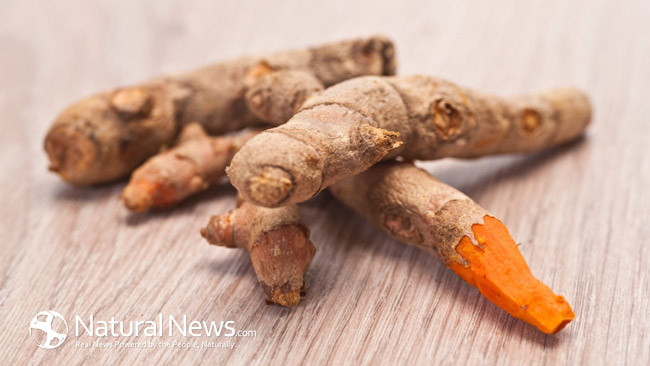Research explores the many health benefits of curcumin
04/02/2021 / By Evangelyn Rodriguez

Turmeric, known scientifically as Curcuma longa, is a multipurpose plant that’s known by many names. It earned the monikers “the golden spice” and “Indian saffron” not only because of its brilliant yellow color, but also its culinary use.
Today, however, turmeric has gained popularity more for its medicinal uses than its usefulness in the kitchen. A staple herb in Ayurvedic medicine, modern researchers are now rediscovering the therapeutic applications of this nifty herb.
In a recent study, a researcher from India discussed the beneficial effects of curcumin, the main active component of turmeric, that have been reported by several studies. This review was published in the International Journal of Herbal Medicine.
Turmeric as a traditional medicine
Turmeric’s long history of use as a natural medicine dates back nearly 4,000 years. In India, an Ayurvedic compendium that can be traced back to 250 BC recommends the use of turmeric for treating the effects of food poisoning. Turmeric is also used to restore physical energy, dispel worms, improve digestion, regulate menstruation, dissolve gallstones and relieve arthritis.
In countries like Afghanistan and Pakistan, folk healers use turmeric to reduce inflammation and soothe gastrointestinal discomfort caused by digestive disorders, such as irritable bowel syndrome. Turmeric has also found use as a cleansing agent for wounds. In some parts of Bangladesh, India and Pakistan, turmeric paste is applied to the skin of brides and grooms before marriage because it is believed to fight bacterial infections and make the skin glow.

The use of turmeric to treat respiratory conditions like asthma, bronchial hyperactivity and allergy, is also well-documented. In addition, turmeric is said to be effective for liver disorders, rheumatism, diabetic wounds, cough and sinusitis. Meanwhile, in Traditional Chinese Medicine (TCM), ayurvedic is known as a medicine for conditions that affect the digestive system. When mixed with milk or water, the herb is also good for colds and sore throats.
The health benefits of curcumin
It is well-known that the medicinal properties of turmeric, a member of the ginger (Zingiberaceae) family, comes from its active component, curcumin. A phenolic compound found in the herb’s roots, curcumin, along with two other curcuminoids — demethoxycurcumin and bisdemethoxycurcumin — is responsible for turmeric’s yellow color.
According to numerous studies conducted over the last few years, curcumin possesses plenty of pharmacological properties, including antioxidant, anti-inflammatory, anti-carcinogenic, antimicrobial, neuroprotective, cardioprotective, anti-diabetic, wound-healing and immunomodulatory activities. These properties allow curcumin to exert a wide variety of beneficial effects on human health and prove useful in preventing chronic diseases.
Research suggests that curcumin from turmeric works by modulating the activities of several important molecular targets, such as transcription factors, growth factors, cytokines and proteins involved in the cell cycle. Extensive epidemiological, clinical and animal studies have elucidated many of the molecular mechanisms underlying curcumin’s biological effects.
Because of their medicinal properties, many researchers support the use of natural products like curcumin either as a pure compound or an extract in pharmaceutical preparations.
Here are some of the science-backed health benefits associated with curcumin: (h/t to Healthline.com)
- Fights inflammation
- Increases the body’s antioxidant capacity
- Improves brain function
- Lowers the risk of brain diseases
- Reduces the risk of heart disease
- Helps treat or prevent cancer
- Helps clear amyloid plaques linked to Alzheimer’s disease
- Helps with arthritis
- Helps treat depression
- Helps delay aging and prevent age-related diseases
Curcumin is a powerful compound that can treat a variety of diseases. However, you’d need to eat large amounts of turmeric to experience its health benefits. Fortunately, you can now purchase turmeric or curcumin supplements from health food stores. These supplements contain high concentrations of curcumin and may also contain piperine, a compound from black pepper that increases the bioavailability of curcumin.
For more stories about turmeric and curcumin, visit Turmeric.news.
Sources include:
Tagged Under: alternative medicine, curcumin, food cures, food is medicine, functional food, herbal medicine, Herbs, natural cures, natural medicine, phytonutrients, remedies, research, turmeric





















